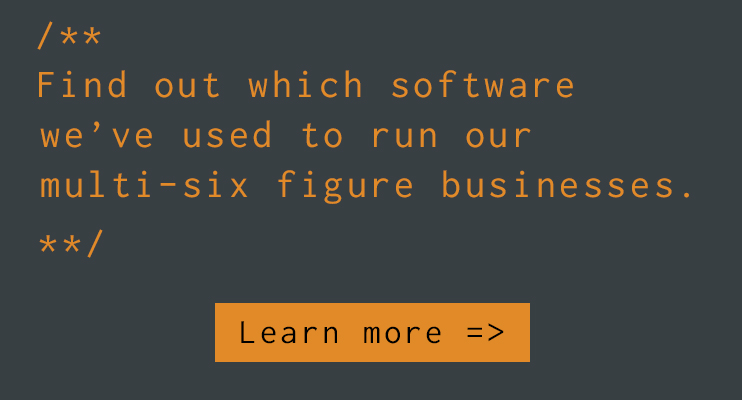For two and a half years, every two weeks I sifted through over 140 blog posts and podcasts that talk about how to build successful online businesses. I found the best content, summarized it, added a bit of my commentary, and delivered it to the inboxes of entrepreneurs around the world…for free. I’m no longer writing Signals in the Noise issues (because my business partners and I are focusing on other parts of Clarity Lab), but please enjoy these archived issues. There’s a ton of useful information in them!

Rome wasn’t guilt in a day.
“With AppSumo we put my time up as a deal where you could talk to me for $250 for an hour. Sold out in a few hours. Fuck. Okay, double the price. $500. Sold out in another few hours. Fine. You guys wanna play tough. Let’s play hard! $1,000 (Dr. Evil expression here) WHAT THE F. Sold out in a few hours???? Why do these people want to talk to me?” That’s Noah Kagan, founder of AppSumo, on why he, like so many people, felt guilty about charging money for his time, services, and products. More importantly, he explains how to overcome that guilt and start making more money by charging for the value and benefits you can deliver. A $1,000 an hour is about what I charge, but my sessions come with free room service.
Category: pricing.
Permission accomplished.
“Real permission works like this: if you stop showing up, people complain, they ask where you went. I got a note from a Daily Candy reader the other day. He was upset because, for three days in a row, his Daily Candy newsletter hadn’t come. That’s permission. Permission is like dating. You don’t start by asking for the sale at first impression. You earn the right, over time, bit by bit.” That’s Seth Godin, explaining the heart of permission marketing (a popular phrase in marketing circles that he coined many years ago.) This post is from 2008, but its message is just as relevant today as it was then. For anyone using content marketing to build a business, this post is an essential reminder to get real permission from the people in your market before you market to them.
Category: marketing
You’ve lost that buying feeling.
I’m a huge believer in the high importance of emotionally engaging copywriting. I’ve seen the positive results of well-written copy that resonates with people on an emotional level in multiple businesses I’ve started and run over the last eight years. (I’m getting emotional just thinking about it.) But, as Brian Clark explains, we need to delineate this whole “people buy based on emotions first” approach a bit.
He says “Over and over you’re told that people buy according to emotion, and it seems not to make sense when it comes down to selling your products and services. Maybe that’s because you’re thinking about emotion in the context of feelings rather than motivation. And that would definitely be confusing, because it’s not feelings you’re after. In fact, provoking feelings can kill the sale instead of prompting it.”
Instead of focusing on sparking feelings in your prospects, you need to focus on invoking states of emotion that cause them to be motivated to take the action of buying. Brian outlines the three most important types of motivating emotions in this post: 1) “I want more of something.” 2) “I want to get away from something.” 3) “I want to obliterate something from the face of the planet with a shoulder mounted rocket launcher.”
Category: copywriting
Better Business Burrow.
“This isn’t a bullshit, head in the clouds, you can do it if you just *believe*post. There’s plenty of those out there. I’m not going to write another one. This post is about how to actually, practically invest in yourself in a way that is going to pay real dividends. How to take the steps today that will enable you to be a better person, a better creative, a better developer or a better business owner tomorrow.” The ever sharp, humble, and smart Jon Westenberg, with a framework you can start using right now, to begin making big changes in your life and business.
In the month that this post has been up on Medium, it’s gotten 3,400 reads and likes. That’s way more than most articles I see on Medium. It’s not a complicated framework, which means you can read this article and start right away. All you need is a spreadsheet and some time. It all starts by making a list of 100 things you want to accomplish in life. Big things. Small things. Long things. Quick things. (Apparently, I’ve been reading too much Dr. Suess.)
I felt so inspired to give this plan a try that I just started my list. I rattled off 20 things and got to “Remotely drive a rover on the Moon.” I would have put “travel to the Moon,” but it’s insanely hot and cold, and there’s no internet.
Category: personal and business growth.
Refill your description.
Amazing. Beautiful. Awesome. Those adjectives, and many of their well-worn cousins, are dampening the power of your writing. Use “awesome” regularly enough, and it’s not awesome anymore. “Awesome” becomes the new “normal.” So we do horrendous acts of word mangling like the also overused “awesomesuace,” or “amazeballs,” (which my wife adorably mixes up by saying “amazingballs.”)
If you’re aching for terribly wonderful adjectives to make your writing stand out, be it in marketing emails, blog post headlines, or sale page copy, head over to Describing Words. Enter a noun you’d like to describe, hit enter, and watch your mind get blown.
This website pulls clever, well-written adjectives from hundreds of books and authors over the last century. This site is delightfully useful and daringly brilliant (and yes, I just used the site to describe itself, which is like asking Siri “Who is Siri?”.)
Category: writing
Hug your freeloaders.
Here’s a common place where many small biz entrepreneurs feel a rub: “You might have a decent list of subscribers, but it’s frustrating when they don’t buy from you. You present an offer, and you end up with little to nothing to show for your efforts. All the email marketing tips and optimization advice you’ve tried haven’t helped.” That’s Neal Sumudre, at the Mirasee blog, on three mistakes that keep your email subscribers from becoming customers. I have a hunch that all three can be solved by sending each of your subscribers free coffee.
Category: email marketing
Consequenced.
“We gave the course away to everyone on our email list for free. BUT there was one significant caveat. In order to get the course, you had to choose a consequence for yourself if you didn’t successfully complete it. The consequence choices were $10, $50 or $100.” Bryan Harris, on a recent experiment he ran with one of his online courses, and why motivating people to taste success by giving them a self-imposed consequence can increase your sales by 15x. I read this post last week, and the next day, my 8-year-old son asked for a chocolate cupcake with his lunch. I said, “Sure, but you need to choose a consequence for yourself if you don’t finish your lunch. Your choices are to pay me $10, $20, or $30.” He thought for a moment, then said, “Papa, the premise of your offer is illogical.”
Category: sales psychology
Not trust another pretty face.
“If you want anyone to trust you. To pay attention to you. To maybe one day buy from you. Your best option is to remove all the barriers in your message. To sound more like how you sound when you talk to a friend. To sound like just another human. Because ‘just another human’ is much more relatable than a corporation. Authenticity is powerful. It’s easy. And we all already know how to do it.” That’s Mikael Cho, from the Crew blog, on why authenticity trumps beauty. I try hard to write these newsletters as if you and I are sitting at the same table in the Laughing Goat cafe in Boulder, where I’m sitting right now. Speaking of which, holy crap, did you see the episode 9 of Westworld last night?! Insane mind bender.
Category: branding
It’s just a matter of semantics.
Google’s search engine continues to get smarter and smarter, and it’s now fortified with a heavy dose of artificial intelligence and semantic search. The search engine optimization world is abuzz with a recent update Google did to its algorithms. The upshot? The more you focus on writing great content for humans, and not search engines, the better off you’ll be.
Alexis Sanders, from Moz, explains that “The method of integrating semantic search signals has huge implications about how we approach our SEO strategies. If we could know all of the topics and keywords associated with a particular entity, we could create perfect content and achieve the optimal rankings for our clients. Although we live in an entity-not-provided world, there are a few tried and true strategies that can enhance your semantic search strategy.” For more on just what the heck semantic search is, and how you can optimize your site’s content for it, head over here.
Category: search engine optimization
Antisocial media.
Here’s a beautiful reminder to not let social media and your cell phone keep you from connecting with life, and loved ones, around you. From Prince Ma, a powerful spoken word video: Can We Auto-correct Humanity?
I hope today’s issue of Signals has brought you some goodness for your day.
Look, building and running your own business is HARD. And it can get super lonely. But know that you’re not alone. There are thousands of us small business owners trying our best to make a run at a dream.
Hang in there. Read a few pieces from this issue. And if, as I’m hoping, you get a little help from something in this newsletter, I’d love it if you pass this issue of Signals in the Noise along to another entrepreneur who might be having a hard week with their business.
And if you do that, thanks a ton. It helps more than you know.
Here are a couple of links to make it easy, or, you can just forward this email to a friend:
Now, go kick some ass in your business,
~Forest Linden
Editor-in-briefs for Signals in the Noise
Co-founder @ Clarity Lab
P.S. One more thing: there’s a heap ton of archived back issues right over here. Almost a couple year’s worth. Happy reading 🙂

